英语口语学习一个美国留学生的忠告
- 格式:docx
- 大小:17.61 KB
- 文档页数:2
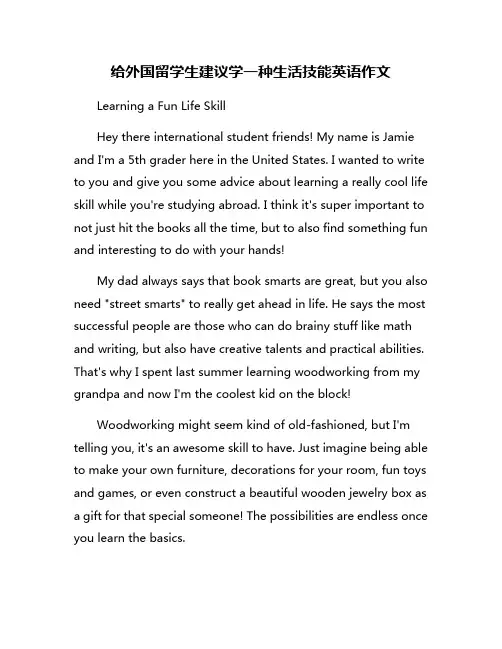
给外国留学生建议学一种生活技能英语作文Learning a Fun Life SkillHey there international student friends! My name is Jamie and I'm a 5th grader here in the United States. I wanted to write to you and give you some advice about learning a really cool life skill while you're studying abroad. I think it's super important to not just hit the books all the time, but to also find something fun and interesting to do with your hands!My dad always says that book smarts are great, but you also need "street smarts" to really get ahead in life. He says the most successful people are those who can do brainy stuff like math and writing, but also have creative talents and practical abilities. That's why I spent last summer learning woodworking from my grandpa and now I'm the coolest kid on the block!Woodworking might seem kind of old-fashioned, but I'm telling you, it's an awesome skill to have. Just imagine being able to make your own furniture, decorations for your room, fun toys and games, or even construct a beautiful wooden jewelry box as a gift for that special someone! The possibilities are endless once you learn the basics.And it's not just about making things either. Woodworking teaches you patience, attention to detail, problem-solving, and spatial reasoning skills. It's like a full brain workout while you're creating something tangible with your own two hands. Way more exciting than just reading a textbook, am I right?The first step is to find a local woodworking shop, community center, or even just a friend or relative who can teach you the ropes. Don't be afraid to ask around - woodworkers are usually pretty friendly and love sharing their hobby with newcomers. They'll likely be stoked to pass on their knowledge to an eager international student like yourself.Once you find your woodworking yoda, here are some of the basics you'll want to start learning:• All about the different types of wood and their unique properties• How to read diagrams and follow woodworking plans• Mastering hand tools like saws, chisels, sanders, and files• Learning to operate power tools safely (drills, saws, lathes)• Cutting, shaping, joining, finishing, and staining techniques• The thrill of building your very first wooden project from scratch!Don't get discouraged if it takes a while to get the hang of it all. Woodworking is one of those skills that takes a ton of practice to become an expert. My grandpa has been doing it for like 60 years and he's still learning new tricks!The most important mindset is to stay patient, have fun with the process, and not beat yourself up over little mistakes. As the saying goes, "measure twice and cut once!" My first few projects were pretty rough around the edges, but each one taught me something valuable.Once you start getting comfortable with the basics, you can start leveling up your woodworking game. Maybe you'll discover a passion for intricate carving and engraving. Or perhaps you'll want to try your hand at furniture making, building wooden models, or even rod building for your fishing hobby. The coolest kids at my school make their own custom skateboard ramps and tech decks!You can also start experimenting with different styles like rustic log furniture, sleek modern designs, ornate woodturning,or going ultra-traditional with hand tool woodworking like they did in ye olden times. The woodworking world is your oyster!Ultimately, the biggest reward of woodworking is the incredible sense of pride and accomplishment you get from building something with your own skills. It's like edible math - you start with an equation, put in the work, and out pops something delicious (or in this case, something awesome made of wood)!Just wait until you can point to a beautiful wooden bench, cabinet, or whatever and say "I made that!" Your friends and family will be in awe of your handiwork. It's such a confidence booster for a kid like me.Who knows, you might even discover a hidden talent and decide to become a professional woodworker someday. Can you imagine how cool it would be to have your own woodworking business or shop? You could make a career out of your passion and creativity. Talk about the dream job!So there you have it - my impassioned sales pitch for why you should absolutely take up woodworking during your studies abroad. It's an invaluable life skill that will stick with you forever, no matter where life takes you next. Plus, it's a fun, hands-on way to unwind from all the headaches of academia.Now get out there and find yourself a woodworking mentor! Your future self will thank you for learning such an awesome practical skill at a young age. And who knows, maybe you'll make me a sweet cedar chest for my 16th birthday present! A kid can dream, right?。
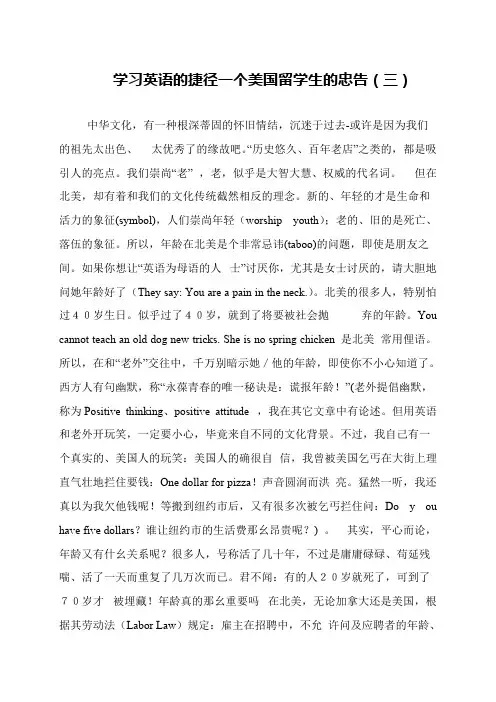
学习英语的捷径一个美国留学生的忠告(三)中华文化,有一种根深蒂固的怀旧情结,沉迷于过去-或许是因为我们的祖先太出色、太优秀了的缘故吧。
“历史悠久、百年老店”之类的,都是吸引人的亮点。
我们崇尚“老” ,老,似乎是大智大慧、权威的代名词。
但在北美,却有着和我们的文化传统截然相反的理念。
新的、年轻的才是生命和活力的象征(symbol),人们崇尚年轻(worship youth);老的、旧的是死亡、落伍的象征。
所以,年龄在北美是个非常忌讳(taboo)的问题,即使是朋友之间。
如果你想让“英语为母语的人士”讨厌你,尤其是女士讨厌的,请大胆地问她年龄好了(They say: You are a pain in the neck.)。
北美的很多人,特别怕过40岁生日。
似乎过了40岁,就到了将要被社会抛弃的年龄。
You cannot teach an old dog new tricks. She is no spring chicken 是北美常用俚语。
所以,在和“老外”交往中,千万别暗示她/他的年龄,即使你不小心知道了。
西方人有句幽默,称“永葆青春的唯一秘诀是:谎报年龄!”(老外提倡幽默,称为Positive thinking、positive attitude ,我在其它文章中有论述。
但用英语和老外开玩笑,一定要小心,毕竟来自不同的文化背景。
不过,我自己有一个真实的、美国人的玩笑:美国人的确很自信,我曾被美国乞丐在大街上理直气壮地拦住要钱:One dollar for pizza!声音圆润而洪亮。
猛然一听,我还真以为我欠他钱呢!等搬到纽约市后,又有很多次被乞丐拦住问:Do y ou have five dollars?谁让纽约市的生活费那幺昂贵呢?) 。
其实,平心而论,年龄又有什幺关系呢?很多人,号称活了几十年,不过是庸庸碌碌、苟延残喘、活了一天而重复了几万次而已。
君不闻:有的人20岁就死了,可到了70岁才被埋藏!年龄真的那幺重要吗在北美,无论加拿大还是美国,根据其劳动法(Labor Law)规定:雇主在招聘中,不允许问及应聘者的年龄、。
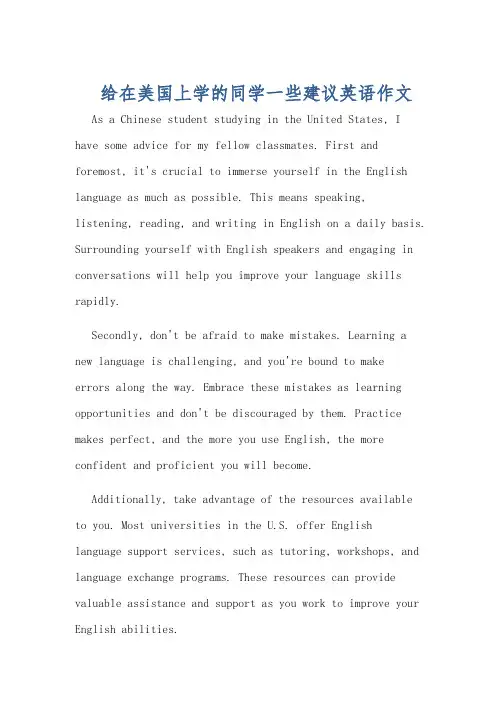
给在美国上学的同学一些建议英语作文As a Chinese student studying in the United States, I have some advice for my fellow classmates. First and foremost, it's crucial to immerse yourself in the English language as much as possible. This means speaking, listening, reading, and writing in English on a daily basis. Surrounding yourself with English speakers and engaging in conversations will help you improve your language skills rapidly.Secondly, don't be afraid to make mistakes. Learning a new language is challenging, and you're bound to makeerrors along the way. Embrace these mistakes as learning opportunities and don't be discouraged by them. Practice makes perfect, and the more you use English, the more confident and proficient you will become.Additionally, take advantage of the resources availableto you. Most universities in the U.S. offer English language support services, such as tutoring, workshops, and language exchange programs. These resources can provide valuable assistance and support as you work to improve your English abilities.Furthermore, it's important to step out of your comfort zone and participate in activities that require English communication. Joining clubs, attending social events, and volunteering are great ways to interact with native English speakers and gain practical language experience.Lastly, don't forget to have fun! Learning a newlanguage should be an enjoyable experience. Find activities that interest you, whether it's watching English movies, reading English books, or listening to English music. Enjoying the process of learning will make it feel lesslike a chore and more like an adventure.作为在美国学习的中国学生,我有一些建议给我的同学们。
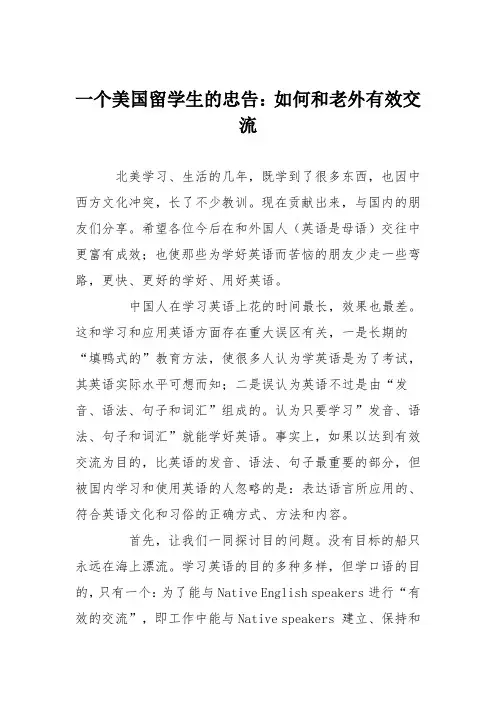
一个美国留学生的忠告:如何和老外有效交流北美学习、生活的几年,既学到了很多东西,也因中西方文化冲突,长了不少教训。
现在贡献出来,与国内的朋友们分享。
希望各位今后在和外国人(英语是母语)交往中更富有成效;也使那些为学好英语而苦恼的朋友少走一些弯路,更快、更好的学好、用好英语。
中国人在学习英语上花的时间最长,效果也最差。
这和学习和应用英语方面存在重大误区有关,一是长期的“填鸭式的”教育方法,使很多人认为学英语是为了考试,其英语实际水平可想而知;二是误认为英语不过是由“发音、语法、句子和词汇”组成的。
认为只要学习”发音、语法、句子和词汇”就能学好英语。
事实上,如果以达到有效交流为目的,比英语的发音、语法、句子最重要的部分,但被国内学习和使用英语的人忽略的是:表达语言所应用的、符合英语文化和习俗的正确方式、方法和内容。
首先,让我们一同探讨目的问题。
没有目标的船只永远在海上漂流。
学习英语的目的多种多样,但学口语的目的,只有一个:为了能与Native English speakers进行“有效的交流”,即工作中能与Native speakers 建立、保持和发展良好的工作关系;或生活中结交几个native speaker 的朋友,能够彼此交流感情、相互鼓励和帮助。
而不是为了和同胞交流,也不是为了能和“老外”说上几句诸如:How are you? I am fine,thanks. My English is poor. Bye-bye. 等幼儿园英语而转身离去,搞的“老外”一头露水,找不着北。
(国内很多学英语的朋友,就好像一个苦苦练了10年武功的大侠,“十年磨一剑,双刃未曾试”,终于有一天有机会面对敌人时,想到的招式就是:逃命!)更不是为了“为了说英语”而浪费时间的、没话找话的和老外闲聊---分手几分钟后,别人就再也不想和你交往、也根本记不住你是何方神圣了。
在中国,可怜的老外们,大多饱经那些被问了上千遍雷同的、无聊的、毫无创意的、有时Chinglish 式的问题的摧残和蹂躏,比如,Are you an American? Do you like China? 之类的。
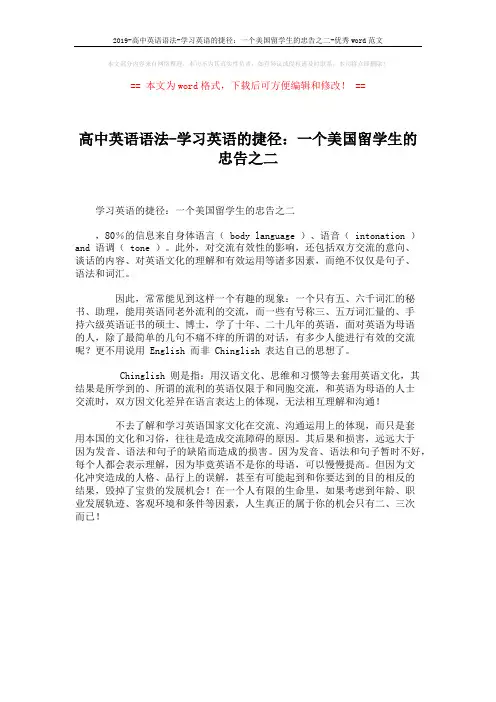
2019-高中英语语法-学习英语的捷径:一个美国留学生的忠告之二-优秀word范文本文部分内容来自网络整理,本司不为其真实性负责,如有异议或侵权请及时联系,本司将立即删除!== 本文为word格式,下载后可方便编辑和修改! ==高中英语语法-学习英语的捷径:一个美国留学生的忠告之二学习英语的捷径:一个美国留学生的忠告之二,80%的信息来自身体语言( body language )、语音( intonation )and 语调( tone )。
此外,对交流有效性的影响,还包括双方交流的意向、谈话的内容、对英语文化的理解和有效运用等诸多因素,而绝不仅仅是句子、语法和词汇。
因此,常常能见到这样一个有趣的现象:一个只有五、六千词汇的秘书、助理,能用英语同老外流利的交流,而一些有号称三、五万词汇量的、手持六级英语证书的硕士、博士,学了十年、二十几年的英语,面对英语为母语的人,除了最简单的几句不痛不痒的所谓的对话,有多少人能进行有效的交流呢?更不用说用 English 而非 Chinglish 表达自己的思想了。
Chinglish 则是指:用汉语文化、思维和习惯等去套用英语文化,其结果是所学到的、所谓的流利的英语仅限于和同胞交流,和英语为母语的人士交流时,双方因文化差异在语言表达上的体现,无法相互理解和沟通!不去了解和学习英语国家文化在交流、沟通运用上的体现,而只是套用本国的文化和习俗,往往是造成交流障碍的原因。
其后果和损害,远远大于因为发音、语法和句子的缺陷而造成的损害。
因为发音、语法和句子暂时不好,每个人都会表示理解,因为毕竟英语不是你的母语,可以慢慢提高。
但因为文化冲突造成的人格、品行上的误解,甚至有可能起到和你要达到的目的相反的结果,毁掉了宝贵的发展机会!在一个人有限的生命里,如果考虑到年龄、职业发展轨迹、客观环境和条件等因素,人生真正的属于你的机会只有二、三次而已!。
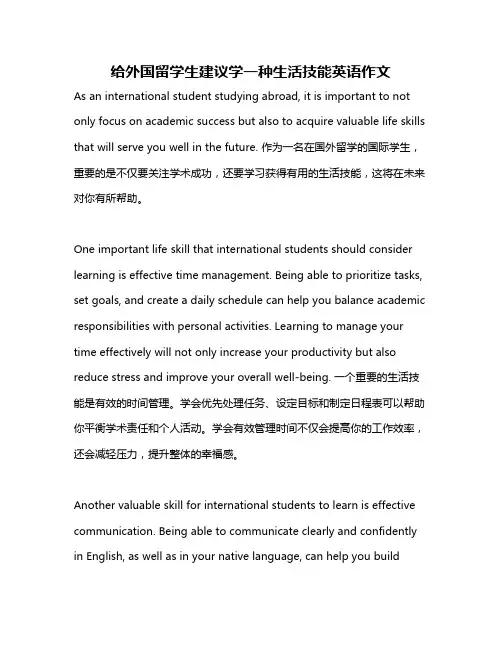
给外国留学生建议学一种生活技能英语作文As an international student studying abroad, it is important to not only focus on academic success but also to acquire valuable life skills that will serve you well in the future. 作为一名在国外留学的国际学生,重要的是不仅要关注学术成功,还要学习获得有用的生活技能,这将在未来对你有所帮助。
One important life skill that international students should consider learning is effective time management. Being able to prioritize tasks, set goals, and create a daily schedule can help you balance academic responsibilities with personal activities. Learning to manage your time effectively will not only increase your productivity but also reduce stress and improve your overall well-being. 一个重要的生活技能是有效的时间管理。
学会优先处理任务、设定目标和制定日程表可以帮助你平衡学术责任和个人活动。
学会有效管理时间不仅会提高你的工作效率,还会减轻压力,提升整体的幸福感。
Another valuable skill for international students to learn is effective communication. Being able to communicate clearly and confidently in English, as well as in your native language, can help you buildstrong relationships with classmates, professors, and employers. Communication skills are essential for networking, presenting ideas, and expressing thoughts and emotions effectively. 学习另一个有价值的技能是有效的沟通能力。
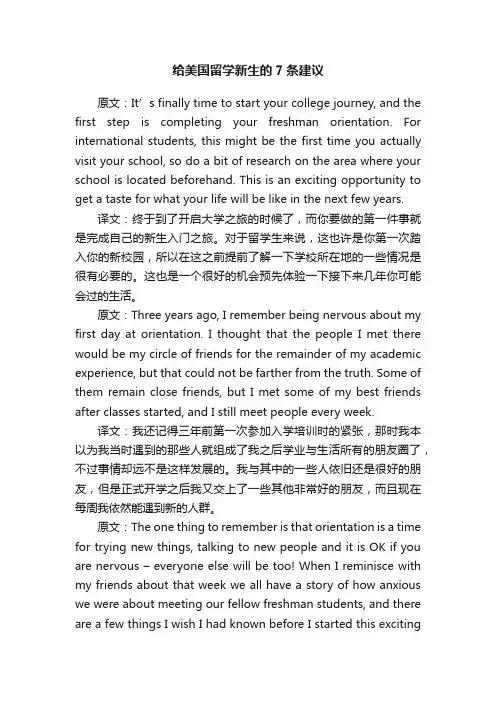
给美国留学新生的7条建议原文:It’s finally time to start your college journey, and the first step is completing your freshman orientation. For international students, this might be the first time you actually visit your school, so do a bit of research on the area where your school is located beforehand. This is an exciting opportunity to get a taste for what your life will be like in the next few years.译文:终于到了开启大学之旅的时候了,而你要做的第一件事就是完成自己的新生入门之旅。
对于留学生来说,这也许是你第一次踏入你的新校园,所以在这之前提前了解一下学校所在地的一些情况是很有必要的。
这也是一个很好的机会预先体验一下接下来几年你可能会过的生活。
原文:Three years ago, I remember being nervous about my first day at orientation. I thought that the people I met there would be my circle of friends for the remainder of my academic experience, but that could not be farther from the truth. Some of them remain close friends, but I met some of my best friends after classes started, and I still meet people every week.译文:我还记得三年前第一次参加入学培训时的紧张,那时我本以为我当时遇到的那些人就组成了我之后学业与生活所有的朋友圈了,不过事情却远不是这样发展的。
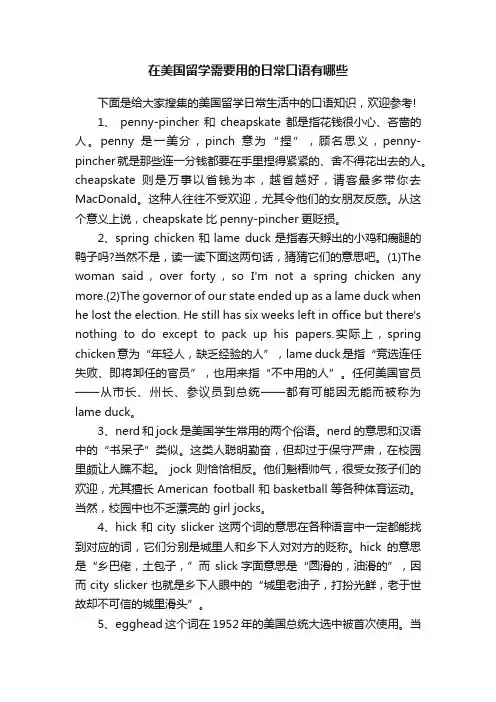
在美国留学需要用的日常口语有哪些下面是给大家搜集的美国留学日常生活中的口语知识,欢迎参考!1、penny-pincher和cheapskate都是指花钱很小心、吝啬的人。
penny是一美分,pinch意为“捏”,顾名思义,penny- pincher就是那些连一分钱都要在手里捏得紧紧的、舍不得花出去的人。
cheapskate则是万事以省钱为本,越省越好,请客最多带你去MacDonald。
这种人往往不受欢迎,尤其令他们的女朋友反感。
从这个意义上说,cheapskate比penny-pincher更贬损。
2、spring chicken和lame duck是指春天孵出的小鸡和瘸腿的鸭子吗?当然不是,读一读下面这两句话,猜猜它们的意思吧。
(1)The woman said,over forty,so I'm not a spring chicken any more.(2)The governor of our state ended up as a lame duck when he lost the election. He still has six weeks left in office but there's nothing to do except to pack up his papers.实际上,spring chicken意为“年轻人,缺乏经验的人”,lame duck是指“竞选连任失败、即将卸任的官员”,也用来指“不中用的人”。
任何美国官员——从市长、州长、参议员到总统——都有可能因无能而被称为lame duck。
3、nerd和jock是美国学生常用的两个俗语。
nerd的意思和汉语中的“书呆子”类似。
这类人聪明勤奋,但却过于保守严肃,在校园里颇让人瞧不起。
jock则恰恰相反。
他们魁梧帅气,很受女孩子们的欢迎,尤其擅长American football和basketball等各种体育运动。
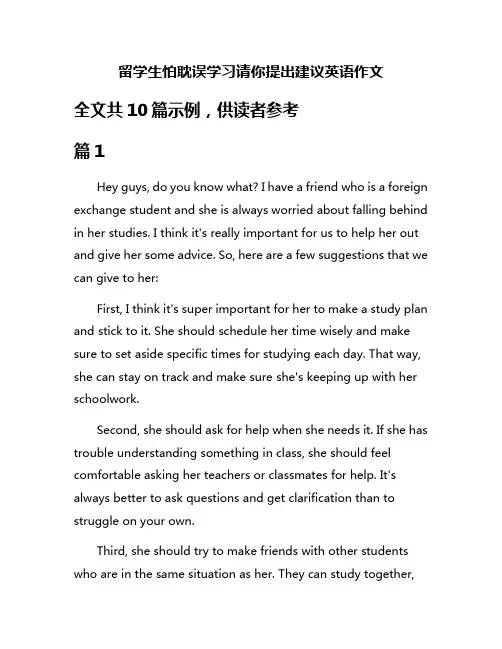
留学生怕耽误学习请你提出建议英语作文全文共10篇示例,供读者参考篇1Hey guys, do you know what? I have a friend who is a foreign exchange student and she is always worried about falling behind in her studies. I think it's really important for us to help her out and give her some advice. So, here are a few suggestions that we can give to her:First, I think it's super important for her to make a study plan and stick to it. She should schedule her time wisely and make sure to set aside specific times for studying each day. That way, she can stay on track and make sure she's keeping up with her schoolwork.Second, she should ask for help when she needs it. If she has trouble understanding something in class, she should feel comfortable asking her teachers or classmates for help. It's always better to ask questions and get clarification than to struggle on your own.Third, she should try to make friends with other students who are in the same situation as her. They can study together,share notes, and support each other through the challenges of studying in a foreign country.Lastly, she should take care of herself and make sure she's getting enough rest and relaxation. It's easy to get overwhelmed with schoolwork, so it's important for her to take breaks and do things that make her happy.I think if she follows these tips, she'll be able to stay on top of her studies and have a great time as a foreign exchange student. Let's all support her and help her succeed!篇2Hey guys, have you ever thought about studying abroad but you're worried it might affect your studies? Well, I have some tips for you!First of all, make sure you choose a good school that offers the courses you need. Do some research and ask for recommendations from people who have studied there before. You want to make sure that the school will support you and help you succeed.Secondly, try to learn the language of the country you will be studying in. It will make it much easier for you to communicatewith your teachers and classmates, and it will also make it easier for you to get around and make new friends.Another tip is to manage your time wisely. Make a schedule and stick to it. Remember that studying is your top priority, so make sure you allocate enough time for it. Don't forget to take breaks and relax, though. It's important to have a balance between studying and having fun.Lastly, don't be afraid to ask for help if you need it. Whether it's from your teachers, classmates, or even your host family, there are always people who are willing to support you. Don't be afraid to reach out and ask for assistance.So, don't let the fear of delaying your studies stop you from pursuing your dreams of studying abroad. With the right preparation and mindset, you can have a successful and enriching experience. Good luck!篇3Hey guys, how's it going? Today I want to talk to you about a problem that some students might have when they study abroad. Yeah, that's right - being afraid of falling behind in their studies.So, being a student who studies overseas can be super fun and exciting, but it can also be a bit scary if you feel like you're not keeping up with your schoolwork. But don't worry, I've got some tips to help you out!First of all, make sure you stay organized and manage your time well. It's important to set aside specific times for studying and completing assignments. Try using a planner or a calendar to keep track of all your deadlines and commitments.Secondly, don't be afraid to ask for help when you need it. Whether it's from your teachers, classmates, or even a tutor, reaching out for assistance can make a huge difference in helping you understand the material and stay on top of your work.Also, remember to take care of yourself both physically and mentally. Getting enough rest, eating healthy, and taking breaks when you need them are all crucial for staying focused and productive.Lastly, don't be too hard on yourself. It's totally normal to feel overwhelmed at times, but just remember to take things one step at a time and stay positive. You've got this!So, there you have it - some tips to help you overcome your fear of falling behind in your studies as an international student. Just remember to stay organized, ask for help when needed, take care of yourself, and stay positive. Good luck!篇4Hi guys, today I want to talk about something important for all the students who study abroad. It's about not letting your studies get messed up because of other things. It's so easy to get distracted when you are in a new country with lots of new things to see and do, but we have to make sure that our main focus is on our studies.First of all, make sure you have a good study schedule. Plan out your week and make sure you set aside enough time for your classes, homework, and studying. If you have a good routine, it will be easier to stay on track and not fall behind.Secondly, don't be afraid to ask for help. If you are struggling with a subject or assignment, don't be afraid to reach out to your teachers or classmates for help. They are there to support you and help you succeed.Thirdly, it's important to take care of yourself. Make sure you eat well, exercise, and get enough sleep. If you are not feeling your best, it will be hard to focus on your studies.Lastly, remember why you are studying abroad in the first place. It's important to keep your goals in mind and stay motivated. Remind yourself that all the hard work will pay off in the end.So let's all work hard and make sure we don't let anything get in the way of our studies. Good luck, everyone!篇5Hey guys, listen up! I wanna talk about something really important today. It’s about all you awesome international students out there who are studying abroad. I know it can be super cool to explore a new country and meet new friends, but we can’t forget the main reason we’re here – to study!I’ve heard some international students worry about falling behind in their studies because they’re having too much fun or getting distracted. But don’t worry, I’ve got some tips to help you stay on track and make the most of your time abroad.First of all, make a study schedule and stick to it. Set aside specific times each day for studying and make sure to focus during those times. Don’t let yourself g et distracted by your phone or social media. Remember, your education is super important!Secondly, don’t be afraid to ask for help if you’re struggling with your schoolwork. Your teachers and classmates are there to support you, so don’t be shy about reaching out for assistance. It’s totally okay to ask questions and get clarification on things you don’t understand.And finally, remember to take care of yourself. Make sure you’re getting enough rest, eating well, and staying active. A healthy body and mind will help you focus better on your studies and stay motivated.So there you have it, my friends. Don’t let the fear of falling behind in your studies hold you back from enjoying your time abroad. With a little bit of planning and self-discipline, you can have a blast and still excel in your academics. Good luck!篇6Hello everyone! Today I want to talk about a very important topic for all the international students out there. It's about howto make sure we don't fall behind in our studies when we have to go abroad to study.First of all, it's super important to stay organized. Make sure to have a planner or a calendar where you can write down all your assignments, deadlines, and exams. This way you can stay on top of your work and make sure you don't forget anything.Secondly, don't be afraid to ask for help. Whether it's from your teachers, classmates, or even a tutor, don't be shy to reach out if you're struggling with something. Remember, it's better to ask for help early on than to wait until it's too late.Also, try to find a study group or a study buddy. Studying with others can be really helpful because you can bounce ideas off each other, help each other with difficult concepts, and keep each other motivated.And of course, don't forget to take care of yourself! Make sure to get enough rest, eat healthy, and exercise regularly. A healthy body leads to a healthy mind, and that's super important when it comes to studying.In conclusion, being an international student can be challenging, but if you stay organized, ask for help when you need it, study with others, and take care of yourself, you canmake sure you don't fall behind in your studies. Good luck, everyone!篇7Title: Advice for exchange students to avoid falling behind in their studiesHey guys! Have you ever thought about studying abroad? It can be super cool to go to another country and learn new things, but it can also be a bit scary. One thing you might worry about is falling behind in your schoolwork. Don't worry, I've got some tips to help you stay on track!First, make sure to stay organized. Keep a calendar or planner to write down important dates like tests, assignments, and deadlines. This way, you won't forget anything and you can plan ahead. Also, try to create a study schedule and stick to it. Find a quiet place to study and make sure to take breaks to keep yourself fresh.Second, don't be afraid to ask for help. If you're struggling with a subject or assignment, reach out to your teachers or classmates for assistance. They want to see you succeed, so don't be shy about asking questions. You can also find study groups or tutoring sessions to get extra support.Next, try to immerse yourself in the language and culture of the country you're studying in. This will not only help you with your studies, but also make your experience more fun and meaningful. Practice speaking English as much as you can and don't be afraid to make mistakes - it's all part of the learning process.Finally, remember to take care of yourself. It's important to balance your studies with other activities like exercise, socializing, and relaxation. If you're feeling overwhelmed, don't be afraid to take a break and recharge. Your health and well-being are just as important as your academics.So there you have it, some tips to help you avoid falling behind in your studies as an exchange student. Remember to stay organized, ask for help when needed, immerse yourself in the culture, and take care of yourself. With these strategies, you'll be able to make the most of your study abroad experience and succeed in your academics. Good luck!篇8Hey guys, have you ever thought about studying abroad? I know it sounds super cool and exciting to go to a different country to learn new things. But sometimes, we might worryabout falling behind in our studies because of the language barrier or different education system.Don't worry, I have some tips to help you out! First of all, you should definitely practice your English skills as much as possible before going abroad. Try to read English books, watch English movies and talk to native English speakers. This will help you feel more confident when you arrive in a new country.Next, make sure to communicate with your teachers and classmates once you're there. Ask questions if you don't understand something and don't be afraid to ask for help. Remember, everyone was once a beginner in a new place.Also, try to stay organized and manage your time wisely. Make a study schedule and stick to it, so you can keep up with your school work. And don't forget to take breaks and have fun exploring your new surroundings.Lastly, be open-minded and willing to adapt to new ways of learning. Embrace the differences and challenges that come with studying abroad, and you'll grow and learn so much more than you ever thought possible.So, don't be afraid to study abroad! With a positive attitude and some good strategies, you'll be able to do great in your studies and have an amazing experience. Good luck!篇9Hey guys, do you know what worries international students the most when they study abroad? It's falling behind in their studies! That's why I want to share some tips to help you avoid this problem and make the most of your time as a student in a foreign country.First of all, it's super important to manage your time wisely. Make a study schedule and stick to it. Don't procrastinate, because that will only make you stressed and overwhelmed. Break down your tasks into smaller chunks and tackle them one by one. This will help you stay on track and make sure you don't fall behind.Secondly, don't be afraid to ask for help. If you're struggling with a subject or assignment, reach out to your teachers, classmates, or even a tutor. They are there to support you and help you succeed. Don't be shy or embarrassed to ask for clarification or guidance, it shows that you are motivated to learn and improve.Also, make use of all the resources available to you. This includes libraries, online databases, study groups, and writing centers. Take advantage of workshops, seminars, andextra-curricular activities that can enhance your knowledge and skills. The more you explore and engage with different learning opportunities, the more you will grow as a student.Lastly, don't forget to take care of yourself. Make sure you get enough rest, exercise, and healthy meals. A healthy body and mind are essential for academic success. Don't neglect your well-being in pursuit of academic excellence. Remember, it's all about finding a balance between work and play.So, my fellow international students, don't let the fear of falling behind hold you back. With these tips in mind, you can stay on top of your studies and enjoy your time abroad to the fullest. Good luck and keep learning!篇10I'm a little kid, and I want to give some advice to international students who are worried about studying. Don't worry, I'm here to help!First of all, it's important to have a good schedule. Make a list of all your classes, assignments, and exams, and make sureyou have enough time to study for each one. Don't leave everything until the last minute, because that's when you'll start to panic.Next, find a quiet place to study where you can concentrate. It could be a library, a coffee shop, or even just your room. Turn off your phone and other distractions so you can focus on your work. If you need help with something, ask your teachers or classmates for help. Don't be afraid to ask questions, because that's how you'll learn.Also, make sure you take breaks when you need them. Studying for hours on end can make your brain tired, so it's important to take short breaks every now and then. Go for a walk, have a snack, or do something fun to relax. Your brain will thank you for it!Finally, don't forget to take care of yourself. Eat healthy food, get enough sleep, and exercise regularly. A healthy body leads to a healthy mind, and that's important when you're studying hard.So there you have it, some advice from a little kid to international students. Study hard, but don't forget to take care of yourself too. Good luck!。

英语短文美国社会学家对大学毕业生的忠告又到毕业季了,即将踏上社会的青年们,下一步该做什么呢?下面是两位美国社会学家压箱底的建议,关于爱,家庭,友谊和生命的意义,希望你能找到答案。
1. Don’t worry about making your dreams come trueCollege graduates are often told: “follow your passion,”do “what you love,”what you were “meant to do,”or “make your dreams come true.” Two-thirds think they’re going find a job that allows them to change the world, half within five years. Yikes.This sets young people up to fail. The truth is that the vast majority of us will not be employed in a job that is both our lifelong passion and a world-changer; that’s just not the way our global economy is. So it’s ok to set your sights just a tad below occupational ecstasy. Just find a job that you like. Use that job to help you have a full life with lotsof good things and pleasure and helping others and stuff. A great life is pretty good, even if it’s not perfect.2. Make friendsAmericans put far too much emphasis on finding Mr. or Ms. Right and getting married. We think this will bring us happiness. In fact, however, both psychological well-being and health are more strongly related to friendship. If you have good friends, you’ll be less likely to get the common cold, less likely to die from cancer, recover better from the loss of a spouse, and keep your mental acuity as you age. You’ll also feel more capable of facing life’s challenges, be less likely to feed depressed or commit suicide, and be happier in old age. Having happy friends increases your chance of being happy as much as an extra $145,500 a year does. So, make friends!3. Don’t worry about being singleSingle people, especially women, are stigmatized in our society: we’re all familiar with the image of a sad, lonely woman eating ice cream with her cats in her pajamas on Saturday night. But about 45 percent of US adults aren’t married and around one in seven lives alone.This might be you. Research shows that youngpeople’s expectations about their marital status (e.g., the desire to be married by 30 and have kids by 32) have little or no relationship to what actually happens to people. So, go with the flow.And, if you’re single, you’re in good company. Single people spend more time with friends, volunteer more, and are more involved in their communities than married people. Never-married and divorced women are happier, on average, than married women. So, don’t buy into the myth of the miserable singleton.4. Don’t take your ideas about gender and marriage too seriouslyIf you do get married, keep going with the flow. Relationship satisfaction, financial security, and happy kids are more strongly related to flexibility in the face of life’s challenges than any particular way of organizing families. The most functional families are ones that can bend. So partnering with someone who thinks that one partner should support their families and the other should take responsibility for the house and children is a recipe for disaster. So is being equally rigid about non-traditional divisions of labor. It’s okay to have ideas about how to organize your family but your best bet forhappiness is to be flexible.5. Think hard about whether to buy a houseOur current image of the American Dream revolves around homeownership, and buying a home is often taken for granted as a stage on the path to full-fledge adulthood. But the ideal of universal home ownership was born in the 1950s. It’s a rather new idea.With such a short history, it’s funny that people often insist that buying a house is a fool-proof investment and the best way to secure retirement. In fact, buying a house may not be the best choice for you. The mortgage may be less than rent, but there are also taxes, insurance, and the increasingly common Home Owners Association (HOA) fees. You may someday sell the house for more than you bought it but, if you paid interest on a mortgage, you also paid far more than the sale price. You have freedom from a landlord, but may discover your HOA is just as controlling, or worse. And then there’s the headache: renting relieves you from the stress of being responsible for repairs. It also offers a freedom of movement that you might cherish.So, think carefully about whether buying or renting is a better fit for your finances, lifestyle, and future goals.6. Think even harder about having kidsOne father had this to say about children: “They’re a huge source of joy, but they turn every other source of joy to shit.” In fact, having children correlates with both an increased sense of purpose in life and a long-lasting decrease in individual and marital happiness. Having kids means spending a lot of your short life and limited income on one source of joy. You have only so much time and money and there are lots of ways to find satisfaction, pleasure, and meaning in this life. Consider all your options.1. 追随梦想,不要心慌大学毕业生们常常会听到,“追随梦想”,“做你喜欢做的事”,“让你的梦想成真”。
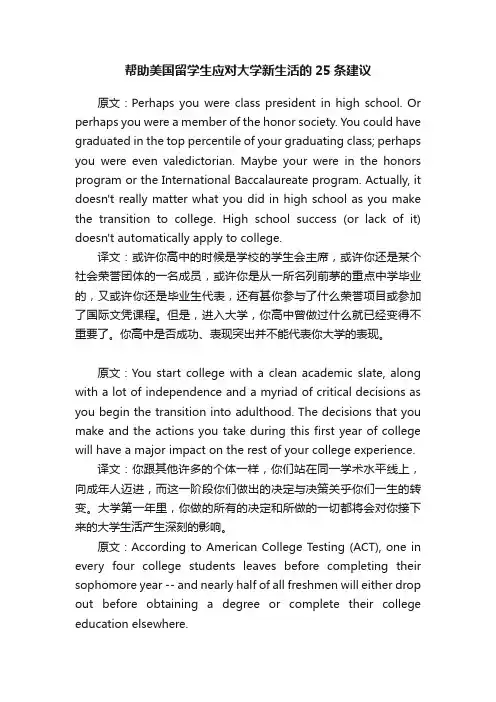
帮助美国留学生应对大学新生活的25条建议原文:Perhaps you were class president in high school. Or perhaps you were a member of the honor society. You could have graduated in the top percentile of your graduating class; perhaps you were even valedictorian. Maybe your were in the honors program or the International Baccalaureate program. Actually, it doesn't really matter what you did in high school as you make the transition to college. High school success (or lack of it) doesn't automatically apply to college.译文:或许你高中的时候是学校的学生会主席,或许你还是某个社会荣誉团体的一名成员,或许你是从一所名列前茅的重点中学毕业的,又或许你还是毕业生代表,还有甚你参与了什么荣誉项目或参加了国际文凭课程。
但是,进入大学,你高中曾做过什么就已经变得不重要了。
你高中是否成功、表现突出并不能代表你大学的表现。
原文:You start college with a clean academic slate, along with a lot of independence and a myriad of critical decisions as you begin the transition into adulthood. The decisions that you make and the actions you take during this first year of college will have a major impact on the rest of your college experience.译文:你跟其他许多的个体一样,你们站在同一学术水平线上,向成年人迈进,而这一阶段你们做出的决定与决策关乎你们一生的转变。
美国留学生的英语演讲范文演讲稿不仅要充分体现演讲者独到、深刻的观点和见解,而且还要对声调的高低、语速的快慢、体态语的运用进行设计并加以注释,以达到最佳的传播效果。
一起来看看美国留学生的英语演讲,欢迎查阅!美国留学生的英语演讲1hello everyone!Everyone has a dream,it is everybody yearning. But the man without a dream of the life will be empty. But dreams are always with the thought of advance and change. Begin to remember,I have a dream. I hope I have money,people always ask:”boy, this is a great dream, have money, what are you going to do?” ” I’m going to buy chocolate.”” if you have a lot of money?” ” I will buy a lot of chocolate.””if you have money to burn?” ” I’ll buy chocolate factory.” Indeed when we,innocent,with a kind heart, happineand joy is a constant movement. When I was young, I have a dream.I hope you can become a kite, floating in the sky, and then slowly fell down. Then in the green meadow like playing with companion, often chasing the white clouds in the sky, let the flap with laughter,do the multicolored multicoloured dream. Read, I have a dream. I hope to have a basketball; when I had time for basketball, but also want a football; when I play football,volleyball became my pursuit. Another has a dream into a reality when, in fact I believe that the dream is not far away from me,as long as childish play, will be the realization of a dream. Slowly into the primary school, middle school, high school .... Will feel more pressure there, so will not be a dream, only know that reading to die, there is no note of those happy. Remember, Ihave a dream. I hope that day will not have a lot of homework to do.美国留学生的英语演讲2hello everyone!I have a dream that one day every vally shall be e_alted,every hill and mountain shall be made low, the rough places will be made plain, and the crooked places will be made straight,and the glory of the Lord shall be revealed, and all flesh shall see it together.Wow, what a dream it has been for Martin Luther King. But the changing world seems telling me that people gradually get their dreams lost somehow in the process of growing up, and sometimes I personally find myself saying goodbye unconsciously to those distant childhood dreams.However,we meed dreams. They nourish our spirit; they represent possibility even when we are dragged down by reality. They keep us going. Most successful people are dreamers as well as ordinary people who are not afraid to think big and dare to be great. When we were little kids,we all dreamed of doing something big and splashy, something significant. Now what we need to do is to maintain them, refresh them and turn them into reality. However, the toughest part is that we often have no ideas how to translate these dreams into actions. Well, just start with concrete objectives and stick to it. Don’t let the nameless fear confuse the eye and confound our strong belief of future. Through our talents, through our wits, through our endurance and through our creativity, we will make it.Hold fast to dreams,for if dreams die,life is a broken-winged bird that cannot fly. Hold fast to dreams,for when dreams go, life is a barren field frozen with snow. So my dearfriends, think of your old and maybe dead dreams. Whatever it is, pick it up and make it alive from today.Thank you!美国留学生的英语演讲3Teacher:the classmate,Hello!Today,I want to topic is my dream.BianLan prodect,any one’s success is its ideals of youth.Einstein’s famous physicists to realize my ideal of struggle,finally developed household relativity,Ms lantern in the ideal incentive nightingale,with his actions of countless soldiers warm heart...Of course,I also have ideal,is when a writer!In my eyes,as a writer is a holy thing.Sitting on the desk,moment constantly to catch the brain of rapid flashes,will they written up,then with e_citement silently with a few times,this is a kind of enjoyment.Besides writers can benefit,also can cause a group of readers,this isn’t kill?From small,I admire those writers,admire them e_cellent writing skills and rich imagination.See,they point to a piece of ordinary things become so colorful,let people read,don’t forget rhyming two-syllable.Zhu ziqing’s prose ”hurry,let me feel time passes,the writer in the flowers,but let me understand the life philosophy.These later inspired me writing desire.This confirms the writer’s determination when I.From then on,I began to realize this dream.In order to make the ideal soon become reality,I read a voracious,benefited the famous renowned nutrients,Hugo,DaZhongMa,dickens...A series of literary works of star in my mind,my writing.Before,I thought to write a composition is a torment,but now,writing to me is happy,is a kind of enjoyment.I feeling a lot from daily life canrealize the life philosophy,writing let me benefit a lot!Of course,want to become a writer from love writing,this process is not easy,it will be full of hardships,full of bitter.Remember someone once said that the famous monument generation is also available for posterity,monument,walls and admiration and follow that many people fear and retreat.So,for me,it is to become a real writer,the first to be a solid foundation.In daily life,I always learn to hold such idea,read more,think more and more,learn more,listen more and more.Reading is reading,the accumulation of beauty lovers,let oneself of ci meaningful work,Think more is e_cellent in appreciation,analytical and absorption,and creative use of his works to,Read and listen to the small things in life is accumulated,choose the material,can yourself skillfully into their works.Many famous and so do,as the resurrection is LieFu according to hear a story Tolstoy and tragic realistic life and harmony,real people or things easier to produce shock effect,Learn to learn more writing skills,it is the most important,if only in words and die,write articles is empty,showy,Writing is often more practice,which is the most important to improve writing a link.For a true writer when the ideal,I have been in the aspects of doing the unremitting efforts.What is the ideal of life is ideal,ZhiLuBiao,he can bring people desire motivation.Although my ideal looks very far away,but I believe that through my effort,the ideal in the near future will become a reality!美国留学生的英语演讲4Good morning,ladies and gentlemen,today i am so happy to stand here to give you a speech.Or rather, a real story of mine.Though with time going by,i can still remember what youonce told me.You should be a brave girl.Smiling,you looked into my eyes.Year in,year out,nearly most of my memories are fading little by little.But only this simple sentence remained,without being forgotten in my life.Again and again,i can not stop myself from thinking about it.So ordinary,but so impressive,so moving,just like the brightest sunshine,it helps me go through the darkest night.I am such a sensitive girl in your heart.You said,my sorroful facial e_pression made feel so distersssed.However,there is one thing i never tell you,that is ,i am becoming a big girl gradually with your words and smiles.I never tell you about it,for i believe oneday,you can see the great changes of mine for yourself.That is what i want to do in return.As i know,that will be the best gift for you.I suddenly think of a song named MY HEART WILL GO ON.There is a beautiful sentence going like this.You are safe in my heart.More than once,i was moved to tears by it.I know ,i am also safe in your heart.i have already forgotten when i told you i was going to leave for Australia this summer holiday.You just smiled as usual,gently speaking.Whatever you decide to do,i will be in favor of it,but, just onething,remember,when you fell lonely abroad,do not forget we are here ,praying for you.We are all around you,far across the distance and space between us.i closed my eyes,the flashback started.The memories we had together,once we played games on the palyground,we played jokes on each other,you always wrote a lot of sentences on my articles to encourage me.And the most unforgetable thing,you told me,you believed m i could be a big girl.Sooner or later.At that specific moment,i suddenly understood the meaning of this sentence totally.So on that day,i smiled as you used to,looking at you.The last words i said were,keep walking insunshine.Yes,keep walking in sunshine.I said to you ,also to myself.I know i am not alone wiht your company,and we can keep walking in sunshine till the last minute of our days.I promise,i will be a big girl.I promise,i will be a brave girl.I promise,i will keep walking in sunshine.That is my speech,thank you!美国留学生的英语演讲5ladies and gentlemen, boys and girls,i am chinese. i am proud of being a chinese with five thousand years of civilization behind. i‘ve learned about the four great inventions made by our forefathers. i‘ve learned about the great wall and the yangtze river. i‘ve learned about zhang heng and i‘ve learned about zheng say s the yellow river civilization has vanished?i know that my ancestors have made miracles on this fertile land and we‘re still making miracles. who can ignore the fact that we have established ourselves as a great state in the world,that we have devised our own nuclear weapons, that we have successfully sent our satellites into space,and that our gnp ranks no. 7 in the world? we have e_perienced the plunders by other nations, and we have e_perienced the war. yet, based on such ruins, there still stands our nation——china,unyielding and unconquerable!i once came across an american tourist. she said,——china has a history of five thousand years,but the us only has a history of 200 years. five thousand years ago, china took the lead in the world, and now it i s the us that is leading.‖ my heart was deeply touched by these words. it is true that we‘re still a developing nation,but it doesn‘t mean that we can despiseourselves. we have such a long-standing history, we have such abundant resources,we have such intelligent and diligent people, and we have enough to be proud of. we have reasons to say proudly: we are sure to take the lead in the world in the future again,for our problems are big,but our ambition is even bigger,our challenges are great,but our will is even greater.i am chinese. i have inherited black hair and black eyes. i have inherited the virtues of my ancestors. i have also taken over responsibility. i am sure, that wherever i go, whatever i do, i shall never forget that i am chinese!。
美国留学生经典句子英文1. "Studying abroad in the United States has been the most transformative experience of my life."2. "Living in a foreign country has opened my eyes to new perspectives and cultures."3. "I have learned so much both inside and outside of the classroom during my time as a student in the United States."4. "The diversity and inclusivity I have experienced in the United States has been truly inspiring."5. "I am grateful for the opportunities and resources available to me as an international student in the United States."6. "Being surrounded by a global community of fellow students has broadened my horizons."7. "Studying in the United States has helped me develop valuable skills that will benefit me in my future career."8. "I have made lifelong friends from around the world during my time as a student in the United States."9. "I appreciate the academic freedom and flexibility that studying in the United States provides."10. "The support and guidance from my professors and advisors have been instrumental to my success as an international student."11. "Studying in the United States has allowed me to challenge myselfacademically and personally."12. "I have gained a greater sense of independence and self-reliance through my experiences as a student in the United States."13. "I have had the opportunity to immerse myself in American culture and traditions."14. "The vibrant and dynamic nature of U.S. universities has been exhilarating."15. "Studying abroad has given me a global perspective and a better understanding of the world."16. "I have learned to adapt to new situations and overcome challenges during my time in the United States."17. "The emphasis on critical thinking and creative problem-solving in American education has been invaluable."18. "I have been exposed to a wide range of academic disciplines and have been able to explore my interests freely."19. "Living in the United States has provided me with a wealth of opportunities for personal and professional growth."20. "I am grateful for the support and resources available to international students in the United States."21. "Studying abroad has allowed me to step outside of my comfort zone and embrace new experiences."22. "I have been able to develop my communication and interpersonalskills through interactions with people from diverse backgrounds." 23. "The research opportunities and state-of-the-art facilities available at U.S. universities have enhanced my academic experience."24. "Studying in the United States has given me a deeper appreciation for different cultures and perspectives."25. "I have been inspired by the passion and dedication of my fellow international students who have pursued their dreams in the United States."26. "Being a part of a global community has broadened my understanding of global issues and challenges."27. "Studying abroad has allowed me to forge connections and create a network that extends across continents."28. "I have grown personally and professionally through my experiences as an international student in the United States."29. "The exposure to a variety of teaching methods and approaches has enriched my learning journey."30. "I have been amazed by the wealth of resources and opportunities available to students in the United States."31. "Studying abroad has taught me the value of time management and organizational skills."32. "Living in a different country has helped me become more adaptable and resilient."33. "I am grateful for the support and guidance from my professors who have helped me navigate the U.S. education system."34. "Studying in the United States has fostered my curiosity and encouraged me to ask questions."35. "I have learned to appreciate and embrace diversity through my experiences as a student in the United States."36. "I am thankful for the friendships and connections I have made with people from all over the world."37. "Living in the United States has allowed me to experience a different way of life and expand my cultural knowledge."38. "I feel privileged to have had the opportunity to pursue my education in such a diverse and inclusive country."39. "Studying abroad has shown me the importance of interdisciplinary learning and collaboration."40. "I am confident that my experiences as an international student in the United States have prepared me for future success."。
给外国学生的学习建议As a foreign student in a new academic environment,it's crucial to have a clear strategy to ensure success. The following are some suggestions that may assist you in navigating your academic journey smoothly.**1. Embrace the Culture**One of the first things you should do is immerse yourself in the local culture. This not only helps you understand the people and their values better but also enhances your language skills. Attend cultural events, engage with locals, and try local cuisine. This will make your learning experience more enriching.**2. Develop Good Study Habits**Organization and time management are key to success in any academic setting. Create a study schedule and stick to it. Set aside specific times for different subjects and allocate enough time for revision and homework. Avoid procrastination and develop a habit of working towards your goals steadily.**3. Active Participation**Classroom participation is essential for understanding concepts and improving communication skills. Don't beafraid to ask questions or share your opinions. This not only helps clarify doubts but also makes you an active learner.**4. Take Advantage of Resources**Most academic institutions provide a wide range of resources to support students. Make use of these resources, such as libraries, mentors, and online platforms, to enhance your learning. These resources can provide additional information and guidance when needed.**5. Practice Makes Perfect**Language learning is a continuous process, and practice is crucial. Speak as much as possible in your target language, even if you make mistakes. Join conversation clubs, participate in debates, and write regularly to improve your language proficiency.**6. Connect with Other Students**Forming study groups or socializing with other students can be beneficial. You can share notes, discuss classmaterial, and provide mutual support. This not only helps with academic success but also builds friendships and a support system.**7. Stay Motivated**Motivation is crucial for staying focused and driven. Set clear goals and reward yourself when you achieve them. Seek inspiration from others and remind yourself of the reasons why you are pursuing your studies abroad. Stay positive and stay committed to your goals.In conclusion, as a foreign student, you have the opportunity to gain not only academic knowledge but also cultural understanding and personal growth. By following these suggestions, you can ensure a successful and enriching academic experience.**给外国学生的学习建议**作为一名外国学生,在新的学术环境中取得成功至关重要。
留学的十条建议英语作文1. Make friends with locals. They can help you adapt to the new environment and culture, and you can learn a lot from them.2. Don't be afraid to try new things. Whether it's food, activities, or experiences, stepping out of your comfort zone can lead to some amazing memories.3. Stay organized and manage your time well. Balancing schoolwork, social life, and personal time can be challenging, but it's important to stay on top of things.4. Take care of your health. Being in a new place canbe overwhelming, but don't neglect your physical and mental well-being.5. Embrace the language. Even if you're not fluent, making an effort to speak the local language shows respect and can help you connect with people.6. Travel and explore. Take advantage of your new surroundings and visit nearby cities or landmarks.7. Keep an open mind. You may encounter customs and traditions that are different from what you're used to, but being open to new experiences can be incredibly rewarding.8. Seek support when needed. Whether it's from fellow students, professors, or counseling services, don'thesitate to reach out for help if you're struggling.9. Stay in touch with loved ones back home. It's important to maintain those connections, even while you're away.10. Have fun and make the most of your time abroad.It's a unique opportunity, so enjoy every moment!。
美国留学生优缺点英语作文As the global landscape of education evolves, studying abroad has become an increasingly popular choice for students worldwide. The United States, with its prestigious universities and diverse culture, is a top destination for international students. However, like any significant life decision, there are both advantages and disadvantages to pursuing an education in the USA.Advantages:1. Quality of Education: The USA is home to some of theworld's leading educational institutions, offering a high standard of education and opportunities for cutting-edge research.2. Cultural Exposure: Living in the USA provides a rich cultural experience, allowing students to learn about American customs, values, and history firsthand.3. Networking Opportunities: Studying in the USA can open doors to a vast professional network, which can be invaluable for future career prospects.4. Diverse Learning Environment: American universities often attract students from all corners of the globe, creating a diverse learning environment that fosters international understanding and cooperation.5. Flexibility of Programs: The American education system is known for its flexibility, allowing students to choose courses that align with their interests and career goals.Disadvantages:1. Financial Burden: The cost of tuition and living expenses in the USA can be substantial, often requiring students to take on significant debt or seek scholarships and financial aid.2. Cultural Adjustment: Adapting to a new culture can be challenging and may lead to feelings of homesickness or culture shock.3. Visa and Immigration Issues: Navigating the visa process can be complex and stressful, with the potential for delays or complications.4. Competitive Environment: The competitive nature of American universities may lead to high levels of stress and pressure to perform academically.5. Distance from Home: Being far from family and friends can be emotionally challenging, particularly during times of stress or difficulty.In conclusion, while the United States offers a wealth of opportunities for international students, it also comes with its own set of challenges. Prospective students shouldcarefully weigh these pros and cons to determine if studyingin the USA is the right choice for them. It is essential tobe prepared for the financial investment, cultural adaptation, and the competitive academic environment that comes with studying in the USA.。
给外国学生学习的建议英语作文English:For foreign students studying English, I would advise them to immerse themselves in the language as much as possible. This means not only studying vocabulary and grammar, but also actively seeking out opportunities to practice speaking, listening, and writing in English. They should try to find language exchange partners or join English-speaking clubs or communities to engage in regular conversations. Additionally, watching English movies and TV shows, listening to English music, and reading English books and articles can also help to improve their language skills. It's important to practice and use the language in real-life situations as much as possible. Furthermore, taking advantage of online resources such as language learning apps and websites can provide additional support and practice opportunities. Finally, it's crucial for students to not be afraid of making mistakes and to be open to receiving feedback from native English speakers, as this is an important part of the learning process.中文翻译:对于学习英语的外国学生,我建议他们尽可能地沉浸在语言环境中。
英语口语学习:一个美国留学生的忠告
北美学习、生活的几年,既学到了很多东西,也因中西方文化冲突,长了不少教训。
现在
贡献出来,与国内的朋友们分享。
希望各位今后在和外国人(英语是母语)交往中更富有
成效;也使那些为学好英语而苦恼的朋友少走一些弯路,更快、更好的学好、用好英语。
中国人在学习英语上花的时间最长,效果也最差。
这和学习和应用英语方面存在重大误区
有关,一是长期的“填鸭式的”教育方法,使很多人认为学英语是为了考试,其英语实际水
平可想而知;二是误认为英语不过是由“发音、语法、句子和词汇”组成的。
认为只要学习“发音、语法、句子和词汇”就能学好英语。
事实上,如果以达到有效交流为目的,比英语
的发音、语法、句子最重要的部分,但被国内学习和使用英语的人忽略的是:表达语言所
应用的、符合英语文化和习俗的正确方式、方法和内容。
首先,让我们一同探讨目的问题。
没有目标的船只永远在海上漂流。
学习英语的目的多种
多样,但学口语的目的,只有一个:为了能与Native English speakers进行“有效的交流” ,即工作中能与Native speakers 建立、保持和发展良好的工作关系;或生活中结交几个na tive speaker 的朋友,能够彼此交流感情、相互鼓励和帮助。
而不是为了和同胞交流,也
不是为了能和“老外”说上几句诸如:How are you? I am
fine,thanks. My English is poor. Bye-bye. 等幼儿园英语而转身离去,搞的“老外”一头露水,找不着北。
(国内很多学英语的朋友,就好像一个苦苦练了10年武功的大侠,“十年
磨一剑,双刃未曾试”,终于有一天有机会面对敌人时,唯一想到的招式就是:逃命!)
更不是为了“为了说英语”而浪费时间的、没话找话的和老外闲聊---分手几分钟后,别人就
再也不想和你交往、也根本记不住你是何方神圣了。
在中国,可怜的老外们,大多饱经那些被问了上千遍雷同的、无聊的、毫无创意的、有时Ch inglish 式的问题的摧残和蹂躏,比如,Are you an American? Do you like China? 之类的。
我发现,有的人竟洋洋得意地说:我英语口语就很好啊,好到能和老外聊几句天儿。
Come on! Give me a break!
英语学到这程度,那由中国式的、复杂的句子结构、严谨的语法和庞大的词汇构成的英语
能力,只不过是“聋子的耳朵,摆设而已” ,因为那不叫“交流”,也根本不值得花这么多时
间学习英语口语。
新加坡的一个人,前一段时间出了本书,叫“亚洲会思考吗”,说亚洲国家,包括日本、韩
国在内,除了会模仿,不具有创新(Innovation)的能力,很难真正意义上和欧美竞争。
但愿不要被他不幸言中了。
我在去美国留学前,自认为英文水平还可以:毕竟学了那么多年,自己也下了许多功夫,
且上了不少培训班---从普通的到最高档次的,里里外外费了上万元。
应付各种考试包括留
学考试,也算是一路过关斩将。
但是,到了美国后,刻骨铭心地学到了一个词“Chinglis h”
---中国式的英语”:用英语和自己同胞交流时还可以应付,但是和"英语是母语"的同学、教授和其他人士进行交流时,一涉及到实质问题,双方谁也听不懂谁!至少有半年的时间
痛苦异常!霎时间自己失去了交流的能力,多年建立起来的信心和信念,像是一下要被摧
毁了。
他们What’s up?What’s new?的说法到能应付,谈谈天气什么的也没问题。
但是,就是
觉得很难和他们去沟通,哪怕只是认认真真地谈谈。
在国内,我很容易和大多数人成为朋友,自己也一直引以自豪,因为你诚心地对待别人,别人通常也已会真心的待你,否则你
下
次对他“敬而远之”就是了。
可在美国开始的时候,怎么就那么费劲?!诚心不起作用了?
阅读了该篇文章的人还浏览过:
英语学习方法总论
来自必克英语 /topic-10615.html。